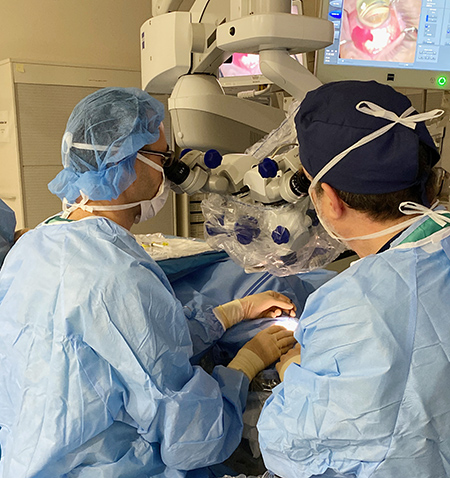Glaucoma Fellowship
 The Clinical Glaucoma Fellowship Program at the UC Davis Health System Eye Center emphasizes the diagnosis, medical and surgical management of both the routine glaucoma patient as well as the complicated glaucoma problems commonly referred to tertiary centers such as ours. Because of faculty interest in pediatric glaucoma, our fellowship program provides a particularly strong experience in this tertiary specialty.
The Clinical Glaucoma Fellowship Program at the UC Davis Health System Eye Center emphasizes the diagnosis, medical and surgical management of both the routine glaucoma patient as well as the complicated glaucoma problems commonly referred to tertiary centers such as ours. Because of faculty interest in pediatric glaucoma, our fellowship program provides a particularly strong experience in this tertiary specialty.
Jennifer Li, M.D.
Director, Cornea and External Disease Service
Professor, Cornea, External Disease and Refractive Surgery
UC Davis Eye Center
Rebecca Chen, M.D.
Assistant Professor, Glaucoma
Michele Lim, M.D.
Vice Chair & Medical Director
Professor, Glaucoma
Fellows see patients with our faculty, James D. Brandt, M.D., Michele C. Lim, M.D., and Annie K. Baik, M.D. at the UC Davis Health System Eye Center’s facilities in the Lawrence J. Ellison Ambulatory Care Center on the Sacramento campus of UC Davis. Fellows actively participate in extremely busy outpatient clinics and perform both laser and incisional surgery, directly staffed by the senior faculty.
Clinical fellows also work side-by-side with ophthalmology residents and are involved in both clinical and surgical supervision of resident clinical activities and educational programs, including glaucoma conferences. Fellows also see routine ophthalmology patients independently one half-day each week and share consult/trauma call in the faculty rotation.
The UC Davis Medical Center is one of the largest Level 1 Trauma Centers in the United States and is the primary tertiary facility for complex multi-system disease in Northern California. The inpatient ophthalmology consultation service sees a diverse array of complex ocular disease – fellows have reported these additional aspects of the fellowship to be particularly interesting and rewarding.
Clinical fellows are strongly encouraged to pursue original research and are provided time to do so. Research can be clinical or basic science in nature, depending upon the qualifications and interest of the fellows. Completion of the project, including presentation at the American Glaucoma Society, AAO or ARVO followed by peer-review publication are the goals of this research.
 Candidates must be graduates of an ACGME-accredited ophthalmology residency in the United States or Canada and have a full, unrestricted license to practice in California from the Medical Board of California prior to starting the fellowship.
Candidates must be graduates of an ACGME-accredited ophthalmology residency in the United States or Canada and have a full, unrestricted license to practice in California from the Medical Board of California prior to starting the fellowship.
The glaucoma fellowship participates in the SF Match Program.
Interviews are conducted in October and November.
Duration of Program:
The program is a 1-year fellowship, beginning July 7th. We ask that the outgoing fellow stay for one additional paid week in July to help orient the incoming fellow to the Glaucoma Service in order to make the transition as smooth as possible.
Teaching and Education:
As the year progresses and the fellow’s knowledge base quickly expands, the fellow will take on more direct teaching responsibility of the resident and medical students on the service. The fellow is expected to attend departmental didactics on Friday morning, participate in quarterly department journal clubs, and prepare presentations for Grand Rounds and other departmental CME events.
Research:
Although this is primarily a clinical fellowship, all fellows are required to present at least one research project at the annual UC Davis Resident/Fellow Research Symposium held at the end of the year. Research projects have varied in the past, depending on the interests of the fellows, and generally include large retrospective chart reviews with the intention to publish. We also have significant collaborations with our veterinary ophthalmology colleagues at UC Davis, and there are opportunities to work with them in the lab on translational research.
Call:
The fellow is expected to be available to the residents by pager or phone with questions about the management of patients with severe glaucoma pathology seen in the emergency room or after hours. The glaucoma fellow should be available for backup and for urgent/emergent glaucoma cases. Additionally, fellows take 2 weeks of attending call every 6 months where they will round on inpatient ophthalmology consults with the consult resident and staff ruptured globes with the chief resident. Ample time is available for fellows to explore the beautiful California region despite their call responsibilities.
Fellows are paid according to the salary scale associated with the postgraduate year (PGY) training level for the fellowship program. Salary scales are approved annually by the University of California, Office of the President, and posted at https:/hr.ucdavis.edu/employees/ucdh-resident.
In addition to your salary, UC Davis Health will provide you with health, dental, vision, life and disability insurance. UC Davis Health also provides comprehensive professional liability coverage. Additional information may be found on the UC Davis GME website at https://health.ucdavis.edu/gme/residents-fellows.html.
Fellows are also allotted a generous amount of vacation time and educational days. Travel reimbursement is available for scientific presentations at professional meetings, and attendance/participation at appropriate meetings is encouraged.
